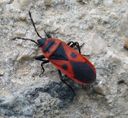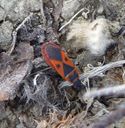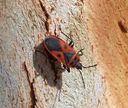Mediterranean Red Bug
Scantius aegyptius
Classification
- Phylum: Arthropoda
- Subphylum: Hexapoda
- Class: Insecta
- Order: Hemiptera
- Suborder: Heteroptera
- Infraorder: Pentatomomorpha
- Superfamily: Pyrrhocoroidea
- Family: Pyrrhocoridae
- Genus: Scantius
- Species: aegyptius
Pronunciation
How to pronounce Scantius aegyptius: /ˈskæn.ti.əs iːˈdʒɪp.ti.əs/
These audio files are automatically generated. While they are not always 100% accurate, they are a good starting point.
Images






Summary
Scantius aegyptius, known as the Mediterranean red bug, is a red bug species in the family Pyrrhocoridae, indigenous to the Mediterranean and now present in North America as an invasive species. It feeds on seeds and seed pods of Malvaceae plants and is characterized by its distinctive coloration used for defense.
Physical Characteristics
Black and red coloration with aposematism; black head, antennae, and legs; red back with two round black spots. Adults measure 7–9 mm in length, while nymphs may be completely red and develop dark spots as they moult.
Identification Tips
Look for the distinct black and red coloration and the presence of black spots on the red back. Size is also a cue, as adults are 7–9 mm long.
Habitat
Ground-dwelling, often found in areas where their host plants (Malvaceae) are present.
Distribution
Native to the Mediterranean; adventive in North America (first found in California in 2009), established in southern California and parts of central California.
Diet
Feeds on seeds and seed pods of plants, specifically those in the Malvaceae family.
Life Cycle
Involves nymphal stages which may appear differently in coloration before developing into adults.
Predators
Uses aposematism as a defense mechanism to deter predators.
Ecosystem Role
Acts as a pest of Malvaceae plant species, impacting local ecosystems and agriculture.
Economic Impact
Considered a pest that may affect crops within the Malvaceae family.
Collecting Methods
- Net sweeping
- Hand collecting
Preservation Methods
- Ethanol
- Pinned specimens
Similar Taxa
- Pyrrhocoris apterus
- Corizus hyoscyami
Misconceptions
Due to its bright colors, it may be mistaken for harmful species, but it primarily acts as a pest for specific plants, rather than being dangerous itself.
Tags
- Scantius aegyptius
- Mediterranean red bug
- Pyrrhocoridae
- invasive species
- hemiptera